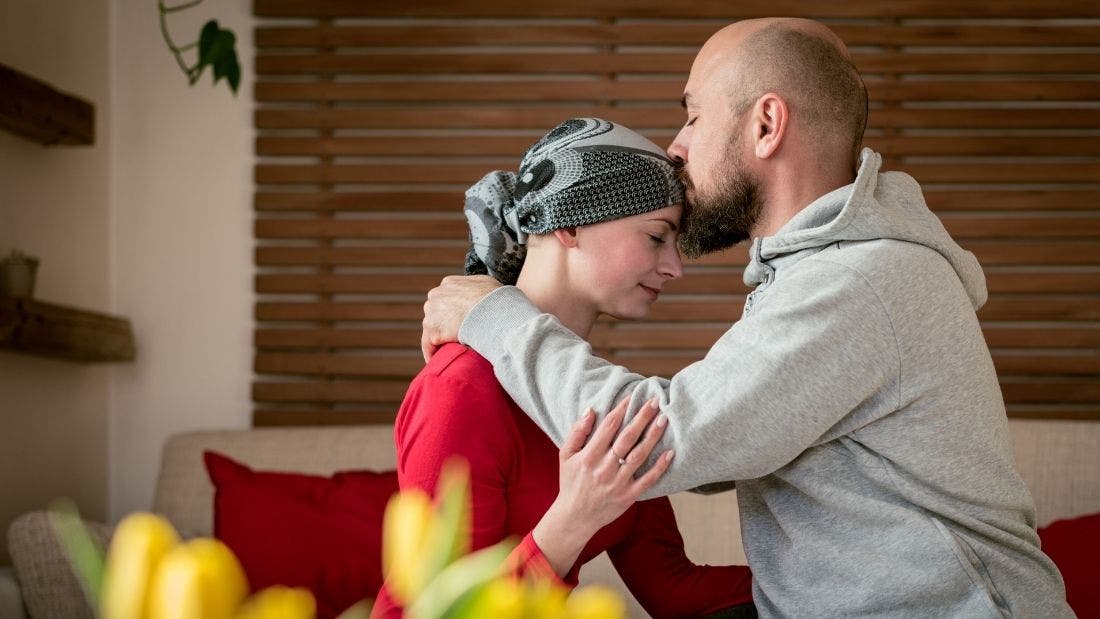Intimacy after Cancer
You are so much more than your cancer diagnosis
Sexuality and intimacy after cancer may feel different, but different does not mean better or worse. It is common for cancer survivors to struggle with body image, low desire for sexual intimacy, or realize a favorite sex position is suddenly uncomfortable. To adapt to these changes, it’s important to develop more openness and confidence in and out of the bedroom. Having concerns and questions about sexual activity after cancer is normal, but keep an open mind about ways to feel sexual pleasure.
Keep Communication Open
Talk about what feels good and what doesn't; communicate with your partner when you are tired or uncomfortable. Don’t be afraid to say what does and doesn’t feel good. Sharing your feelings with your partner can help bring you closer and is the only way for them to know what is working and what no longer works.
Sex is not only about penetration; you can explore other ways to experience pleasure that may be more comfortable. If you’re not able to have the type of sex you’re used to, think of different ways you can become aroused. When you’re not in the mood for sex, you and your partner can still hold hands, kiss, cuddle, or give each other massages.
Plan Ahead
Sex may need to be less spontaneous after treatment. Choosing a particular time can help deal with pain and fatigue and may also build arousal.
Explain to your partner(s) that you may have unexpected side effects despite the plan for sexual activity. A supportive partner will understand that your body has gone through a serious trauma to fight cancer, and you aren't always in control of how you feel. Communicate with each other throughout the day to check in, and use this as an opportunity for some spicy foreplay.
Explore Different Positions and Techniques
Some of the sexual practices you used to enjoy may not be possible after cancer treatment. Surgery after cancer may result in a particular position being painful. Try different positions to find what is best for you and your partner. For example, if lying on your back during penetration is painful, having both partners lying on their sides may be more comfortable.
When cancer means you have to adapt to sexual changes, it can be helpful to embrace a new definition of ‘real’ sex. For many people, arousal does not happen as easily as it once did. Your favorite positions may now be uncomfortable, unsatisfying, or penetrative sex may no longer be possible. Instead, explore different erogenous zones, such as the breasts, ears, or thighs. Consider other techniques like mutual masturbation, oral sex, sex toys, erotic images and stories, and sexual fantasies. Many people find new ways to have a fulfilling sex life after cancer with a playful approach and open communication.
Self-Pleasure Discovery
Self-pleasuring can help you understand what’s changed and what feels good, and you can then talk about this with your partner. Masturbation can be a positive and satisfying way to enjoy sexual activity when you don’t have a partner or if you’re not ready for intimacy with a partner. It can help you find out what your body is capable of sexually.
There are many techniques for penis-owners and vulva-owners to explore sexuality. At Lion’s Den, we carry the very best in pleasure products for you to safely explore your body, indulge in fantasies, and support your sexual wellness.
Boost Your Confidence
If you feel unsure about yourself because of cancer, you may also lack confidence sexually. Things that lift your overall wellbeing, like good food, exercise, and relaxation, will help to boost your sexual confidence.
In addition, explore ways that make you feel your very best. Practice ways every day that teaches you to see yourself as you are, not as a thing you need to improve constantly. Check out our blog on body image, LOVE YOUR BODY, for tips on loving your body exactly as it is.
Talk to a Professional
Some medicines, such as Viagra and Cialis, get more blood to the penis, making it easier for penis-owners to get and keep an erection. Vulva-owners with vaginal dryness can take low-dose estrogen as a pill, use a cream or ring that fits inside the vagina, or a more straightforward solution is to use a lubricant or other stimulating products.
Also, speaking to a doctor or sex therapist or with someone who has been in a similar situation can help you develop personal strategies for adapting to sexual changes. There is no shame in seeking professional support, especially during a time when everyone focuses on your cancer, it can be helpful to have someone dedicated to everything else in your life outside of cancer.
Remember, start slowly and take your time whenever you are ready for sexual relations. Then, talk to your partner about how you are feeling and how things may have changed for you. Having an intimate connection with a partner can make you feel loved and supported as you come to terms with the impact of cancer.
For more tips, visit us on social media.






